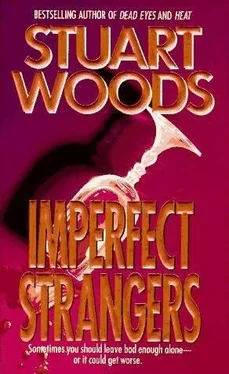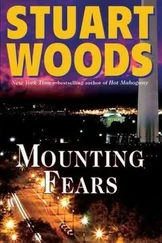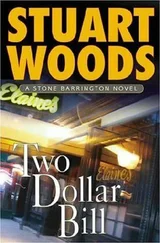"How's the car running?"
"Just great; it's a real pleasure to drive. Well, I'd better get going."
"Glad you called. Keep in touch."
Sandy got out of bed and went to the front door for the Times. Spread across the bottom of the front page were three photographs of the Said shooting, in sequence. In the first, he and Cara could be seen clearly, he apparently looking toward the photographer/shooter. In the second, their heads were nearly out of sight behind the luggage cart, as Said was struck by gunfire, and in the third, they were nowhere to be seen. He took the paper into the bedroom, where Cara was struggling to sit up in bed. "Have a look at this," he said.
Cara blinked at the sight of the photographs, then read rapidly through the story. "I'm glad they didn't mention our names," she said.
"The cop must not have given them out."
"It's a hell of a way to get on the front page, isn't it?" she said.
"A hell of a way."
"Do you think this will make the San Francisco papers?"
"Maybe. Let's cross that bridge when it collapses under us."
"Whatever you say. How about some breakfast?"
"Please."
Cara got into a dressing gown and headed for the kitchen. Sandy shaved, showered and got dressed, then went into the kitchen.
Cara was dishing up eggs and bacon. "I think I'll get our furniture orders in this morning," she said, "then this afternoon, I'll come to your shop and do some measuring, if that's all right."
"That's fine."
"I'm going to have to use Thea's resources to find the right cabinet maker for the shop fixtures," she said. "I think we may have to go to somebody with some theatrical set design experience, to get the right look. It's going to need some distressing, to keep it from looking too new."
"Whatever you say."
"What are you going to do about Peter?"
"I don't know yet; it's going to take some thought."
"Yes, it is."
"Maybe the best thing is just to do nothing; maybe he'll cool off and stay away," he said.
"Maybe, but I'm not going to count on it," Cara replied.
Sandy hit the work hard as soon as he got to the office. He'd been neglecting the business, what with everything else he'd had to contend with over the past weeks, and it needed attention. He called in the shop manager, Ed Klein.
"Ed, you've done a fine job managing the shop," Sandy said. "Now I want you to take a larger role in the whole business, both London and New York."
"I'd like that very much, Sandy," Klein said.
"I'm buying a vineyard, too; that's still hush-hush, until we close the deal, and I'd like you to start thinking of ways we can merchandize our own wines through the shops and mail order."
"That's going to be very exciting," Klein said.
"I'm giving you a twenty percent raise, and I'd like to pick somebody from downstairs to begin stepping into the shop manager's position. Have we got somebody who can do it, or do we have to go outside?"
"Mark Hammond will be perfect," Klein said.
"He's only been here a year or so; are you sure?"
"He works like a beaver; he knows the operation better than anybody else down there."
"I'll take your word for it."
"What's my new job called?"
"How about vice-president and general manager?"
"I like it."
"Something else; now that we're independent from Bailley and Son, I'd like you to put together an employee benefits package-health insurance, profit sharing, life insurance; whatever you think we need to create some loyalty to the company. I want our people to feel secure, and I want their loyalty. Structure it, cost it, and make a recommendation."
"I'll get right on it."
"I want you to spend at least half your time with Mark, until you're sure he has the shop in hand; the rest you can spend on whatever else we come up with." He shook hands with Ed, then turned to looking over that week's ad in the Times.
The phone rang; Sandy picked it up. "Hello?"
"You take a very nice picture," he said. "So does Helena."
Anger welled up in Sandy. "You son of a bitch. I told you never to call me again."
"You lied to me, Sandy."
"You deserved to be lied to. You haven't done anything but lie to me since I met you. You lied about your wife, certainly; you can't be trusted."
"You wound me."
"If I hear from you again, I will."
"Threats, now?"
"Promises. Listen to me very carefully: back off; give it up; let go. Lead your life; let us lead ours. You'll be a happier man, believe me."
"I create my own happiness."
"Don't be self-destructive. You got what you wanted from her. Be happy with what you have."
"Sandy, Sandy; you just don't get it, do you?"
"Get what?"
There was a click, and the connection was broken.
Get what? What did the man want? What would make him go away? Sandy hung up the phone and sat, at a loss about what to do next.
Alain Duvivier sat at his desk, just outside the captain's office, and allowed himself to be watched. This was part of his punishment for screwing up on the Kinsolving murder investigation, to sit and be looked at by the captain through the glass partition of his office. He felt like an ill-behaved child who had been moved to the front row of the classroom, so the teacher could keep an eye on him.
He was working two murders on the East Side-a shopkeeper robbed and shot to death, and a bar owner who'd suffered the same fate. He thought the same perpetrator was responsible for both, and since his bailiwick was the East Side and the robber/murderer was probably from somewhere else, he was depending on favors from detectives in other precincts. His best chance was some word from another detective's snitch from Harlem or the Bronx, somebody flashing too much money, somebody who carried a.44 Magnum pistol, which was what the perpetrator had used. There was no useful physical evidence and no witnesses, either.
A patrolman from the front desk downstairs walked over with a red, white, and blue envelope. "FedEx for you, Al," the man said, tossing the envelope on his desk.
Duvivier wasn't expecting such a delivery; he picked it up and looked at the sender's address. A Thomas Williams, with an address in Los Angeles. Peculiar. He ripped open the envelope and shook out its contents. A smaller envelope fell out, then a small sheet of paper. He picked up the paper.
"He paid me to do it," the message said. It seemed to have been typed with an electric typewriter. And if it was anonymous, the return name and address would be fiction.
Duvivier dropped the sheet of paper onto his desk, aware that fingerprints might get to be a factor in this delivery. He picked up the smaller envelope by its edges, used a letter opener to cut the flap, and shook out the contents. Two keys fell onto the blotter.
"What the hell?" he asked himself aloud. He sat and looked at the keys for a minute or so, trying to remember if keys came into some case he'd worked. He couldn't remember any such case. He took a small fingerprint kit from his bottom drawer and dusted the letter, front and back. The only fingerprints that showed up corresponded to where he had held the paper. He dusted the keys, too, on both sides, but no prints appeared. He wiped off the black powder from the three items, then returned the kit to its drawer.
"Something, Al?" Leary asked from the next desk.
"I don't know," Duvivier replied. "Take a look at this." He handed over the letter and the keys. "It was sent from Los Angeles…" He consulted the Federal Express form. "Yesterday. Has any case we've worked lately had anything to do with Los Angeles?"
Leary thought for a moment. "There was a tourist murdered last month at that hotel on Madison; he was from L.A., but it wasn't our case. Is the envelope addressed to you specifically?"
Читать дальше












